TORONTO – The spotlight’s always shined bright on Bryce Harper.
A once-in-a-generation talent who was blasting 500-foot home runs before he could legally drive, Harper’s lived the life of an anointed baseball prodigy and somehow managed to deliver on sky-high expectations.
Before he was selected first overall in the 2010 draft by the Washington Nationals, he was the “LeBron James of Baseball,” appearing on the cover of Sports Illustrated at 16 years old.
No pressure, right?
“I mean, it’s a good thing and a bad thing,” Harper, now 30, told theScore last month. “You’re 16 years old and you look at an article and you’re on the cover of Sports Illustrated. It’s one of the coolest things ever. You dream about Sports Illustrated, Wheaties boxes, Topps cards at a young age.”
Bryce Harper Sports Illustrated cover when he was 16 years old, 2009 pic.twitter.com/5kmBa9uHE0
— Baseball In Pics (@baseballinpix) March 3, 2022
Those high expectations are unfair no matter how talented a player is. Prospects often crumble under their weight.
Harper didn’t though, and he remains focused on what eludes him, and what he came closest to last October: a World Series title.
“There was a lot of hype about him,” Philadelphia Phillies president of baseball operations Dave Dombrowski said. “Everybody realized that he was one of those future cornerstone players (who) don’t come around very often.”
For Harper – even at 16 – it was all about the bigger picture; it’s what allowed him to be great. He was naturally gifted, yes, but his desire to be the best wouldn’t allow him to fail.
“Just understanding that there was still so much to do. It was just another brick being laid, another step going forward. I just tried to understand that this wasn’t the finished product,” Harper said of how he managed expectations. “I needed to keep working. At 16 years old, you don’t want to just be the best 16-year-old in the world, right? You want to be able to further your career and go from there. The work never stopped.”
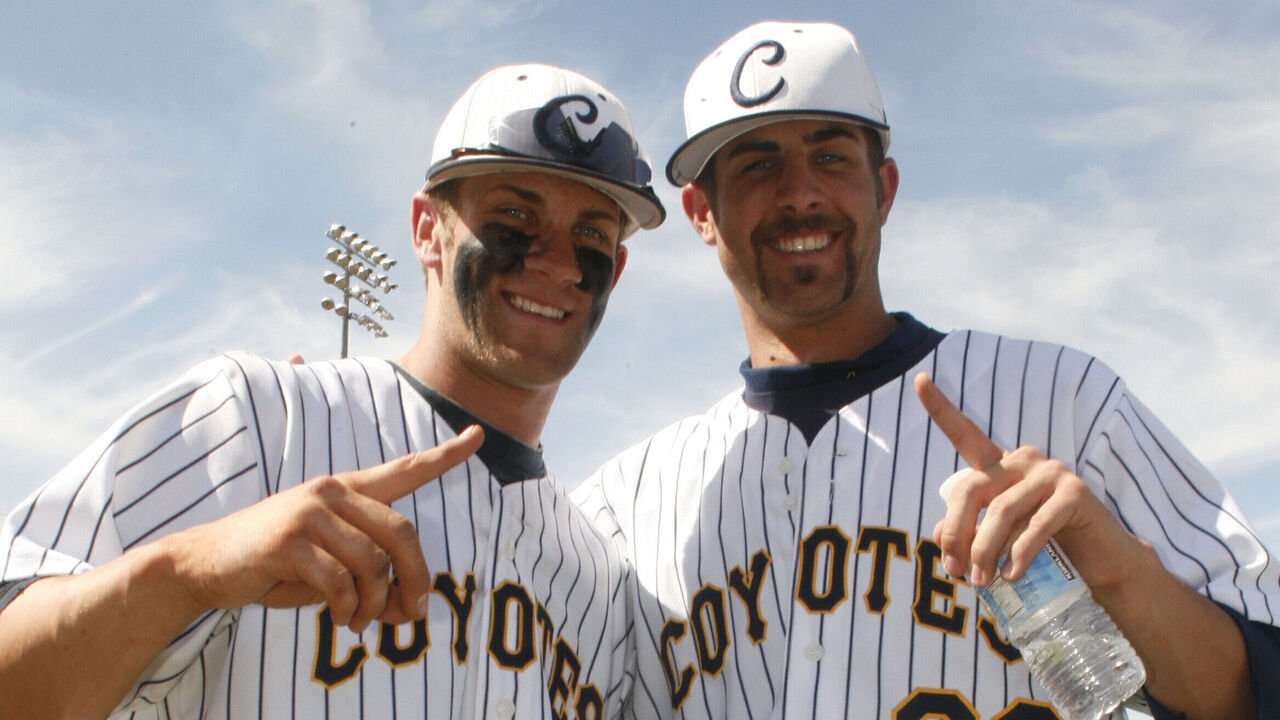
‘We had to grind’
To understand how Harper managed those lofty expectations, you have to know how he was raised.
Harper’s baseball journey began like so many others’, tagging along to his older brother’s games.
“Just watching (Bryan) play,” Harper said of how he got his start in baseball. “He was a few years older than me, so whatever he was doing, I was doing.”
Sports were a big part of life in the Harper house in Nevada. His dad, Ron, played multiple sports when he was young and passed on a love of competition to his children. Bryce was involved in “big-time (baseball) tournaments” when he was 10. He played competitive football until his freshman year in high school, but focused on baseball full time after breaking his wrist.
“That’s when I kind of got pretty serious,” Harper said. “I just kind of took that path.”
Harper grew up in a middle-class family. His mother worked as a paralegal while his father worked as an ironworker foreman, helping build much of the Las Vegas Strip.
“Treasure Island, Mirage, Aria, all your big hotels. You name it, he was on it,” Harper said of his dad. “He ran a lot of big jobs.”
Harper speaks about his parents with much pride; it’s clear how important they are to his life when you talk with him. He credits them for his work ethic. He was taught from a young age to work hard for what you want and believes having that instilled helped him not only reach the majors but also kept him grounded.
“They wanted to give us every single chance they could to get to where we are today,” Harper said. “That was just instilled into all of us, that we had to grind. No matter where you come from, or who you are, just understand it takes a lot of work to be where you are.
“If you’re gonna do this, you’re gonna do it the right way and we’re not gonna waste our time. You’re gonna do something with your whole heart into it.”
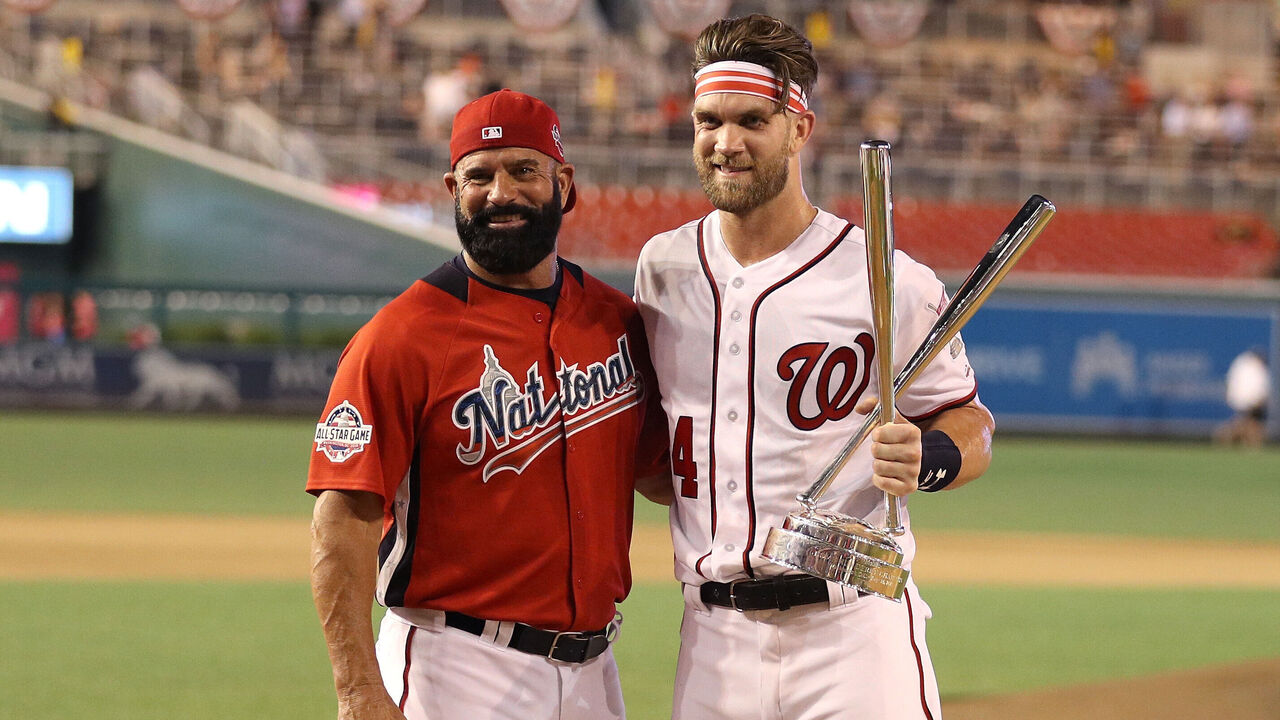
While Harper dreamed in his mid-teens of life as a pro baseball player, his immediate plans were to make sure the sport helped him pay for college. He knew he’d need financial assistance, and baseball was a way of securing it.
“I was definitely going to need a scholarship,” Harper said. “My brother was the same way, and my sister, too. So it’s kind of just, what can we do to be great at what we need to get our education going.”
Harper’s exploits between the lines made it clear he was going places in the sport. He completed his GED during his junior year of high school in 2009, which allowed him to be eligible for MLB’s 2010 draft. He played at the College of Southern Nevada with his brother for one season, where he dominated as a 17-year-old catcher. The Nats made him the No. 1 pick.
It was a pick that changed the trajectory of the franchise, and Harper’s life.
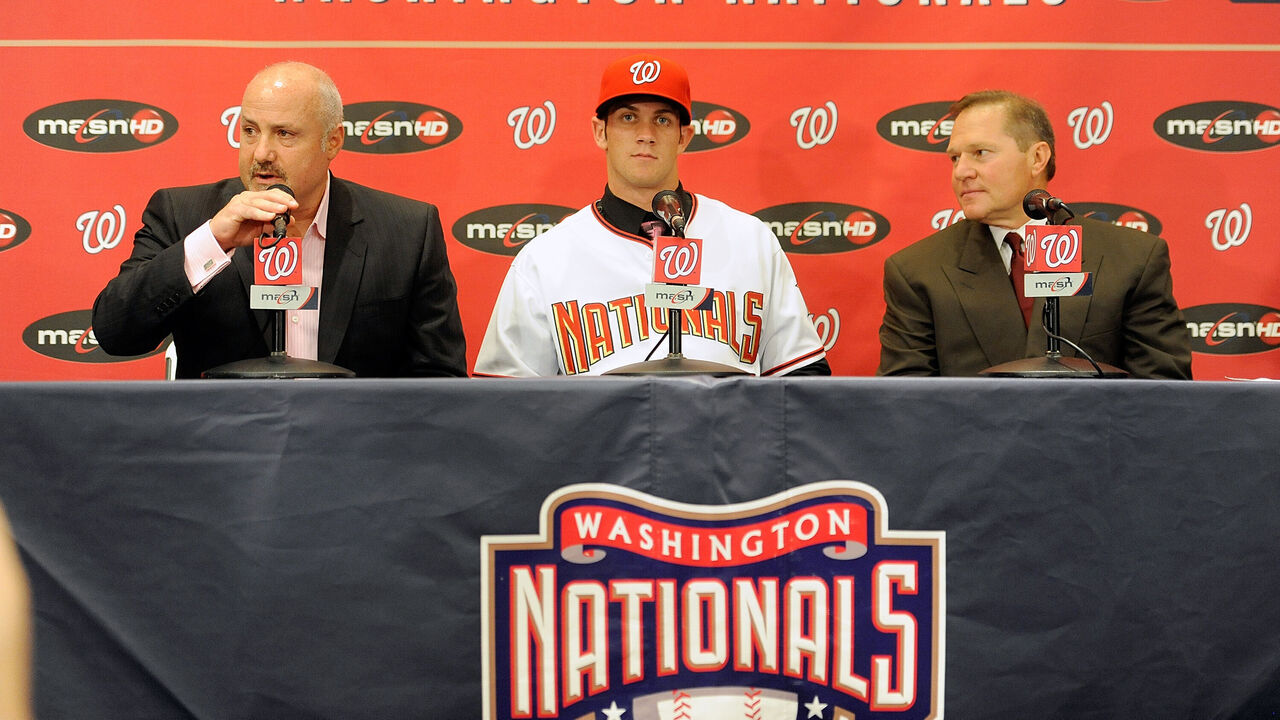
‘Like traveling with a rockstar’
Bob Carpenter’s been the TV voice of the Nationals for 18 seasons.
He remembers the lean early years after the team relocated from Montreal. Washington finished last in the NL East in five of its first six seasons. The Nats went 59-102 in 2008, helping them land Stephen Strasburg first overall. They finished 59-103 in 2009, ensuring themselves Harper.
“I saw the headlines and stuff when (Harper) was still in high school,” Carpenter recalls. “And I’m like, ‘Come on, this guy can’t be that good.’ After we drafted Strasburg in 2009, and then we drafted Bryce … to have two guys like that come along back-to-back, it’s crazy.”
Harper debuted at Dodger Stadium on April 28, 2012. With Strasburg on the mound, he went 1-for-3 with an RBI. He was greeted with loud boos during his first at-bat (a groundout back to the pitcher). A couple innings later, he roped a rocket double off Chad Billingsley for his first hit. The boos grew louder, the ball tossed into the dugout for authentication.
Bryce Harper was officially a major leaguer.
“We were at Dodger Stadium, he had a double, and I swear his hair was on fire,” Carpenter said of Harper’s debut. “My (broadcast) partner F.P. Santangelo used to call it the ‘Bryce Harper run until they tag you play.’ Like Little League, when you’re the best kid out there and you keep running.”
Harper was a 2012 All-Star and the NL Rookie of the Year, hitting .270/.340/.477 with 22 home runs across 139 games. Washington won 98 games, capturing its first NL East title since moving south.
The Nationals and their young star had arrived.
Harper had already been in the spotlight for several years, but things truly took off after his early big-league success. He was booed in visiting parks because he was so hyped. Cole Hamels, a starter in his seventh season in 2012, admitted he hit Harper with a pitch on purpose as an unfriendly welcome to the big leagues. Harper was famously asked “clown” questions. There was a very public dugout fight with teammate Jonathan Papelbon.
“There was definitely a target on his back with the hype around him,” Harper’s former Nationals teammate Max Scherzer told theScore. “But at the end of the day, he also welcomed that. He wanted it. He thrives off that. He wanted to go out there and compete and be the best. He always wanted to be – in a good way – the player that gets a big hit.
“He wasn’t afraid of the moment. That can be a tough thing to do. Sometimes, you kind of gotta experience it. Through his upbringing and how good he was so young, he just constantly had those type of moments, he kind of got used to it. So, even when they happen early in his career, in the big leagues, he seemed very poised in those moments.”
Harper was a lightning rod – and he was electric.
“I thought Bryce handled everything really well. There were a lot of demands on his time,” Carpenter said. “I had a previous experience with this sort of thing, not with a young guy, but when I was with the Cardinals, with the whole Mark McGwire home-run chase in 1998. Mark couldn’t go anywhere. We were sneaking him in and out of the hotel, through the kitchen and going up the freight elevator, and all that stuff, and Bryce, it was a similar thing. It was like traveling with a rockstar. It was crazy. That’s when we really felt the fortunes of the ball club turning around.”
The first few years in the majors can be a whirlwind – especially for a young player with otherworldly expectations. The more successful a player, the more distractions there are. Harper was a comet at only 19 and the Nationals knew he needed a clubhouse mentor.
When Scherzer arrived in Washington, he pointed to Jayson Werth as the team’s leader and someone Harper looked up to.
“I still talk to him to this day,” Harper said of Werth. “He was somebody who I could lean on and somebody who was going to tell me how it was. He has that old-school mentality, that older brother mentality.
“The Nationals at the time needed that type of guy. They weren’t the team yet. He changed not just the culture of the club, but he changed the training room, the food, the workout stuff. I mean, he came over and really revamped a lot of the stuff that they needed to help them win. Once I got up there, he was a really good ear for me and a mind to kind of pick. He was the guy that I could lean on.”
Harper spent seven seasons in Washington (six of those with Werth). He was a six-time All-Star, and claimed the NL MVP in 2015 as a 22-year-old. He was the youngest to ever win the award unanimously, the fourth-youngest to be named MVP, the 16th player to claim both a ROY award and MVP, and was the first winner for the franchise (Expos or Nationals).
Scherzer recalled conversations with Harper during and after his first MVP season. He challenged Harper to keep pushing for more.
“I played with the best. I’m not here to tell you you’re not good. You’re good. I get it. But I’ve seen the best and there’s still another level to your game that you can achieve,” Scherzer remembers telling Harper. “There’s still things you can do. This isn’t over. MVP at 22, this isn’t done. You’re nowhere near your peak.
“Having those types of conversations with him: ‘You’re 22, already winning MVP of the league, but make sure that you understand there’s still work to be done. There’s still things to accomplish as a player. Think of this as a process, not results. It was a hell of a year, but there’s still another level of success if you want it.'”
Despite all that success, and with the Nationals still in their competitive window, the two sides weren’t able to negotiate a contract extension, and Harper hit free agency after the 2018 season. It was reported the Nationals offered a 10-year deal worth $300 million, but with a significant portion of the money deferred.
Harper moved on after seven seasons, and he didn’t go far.
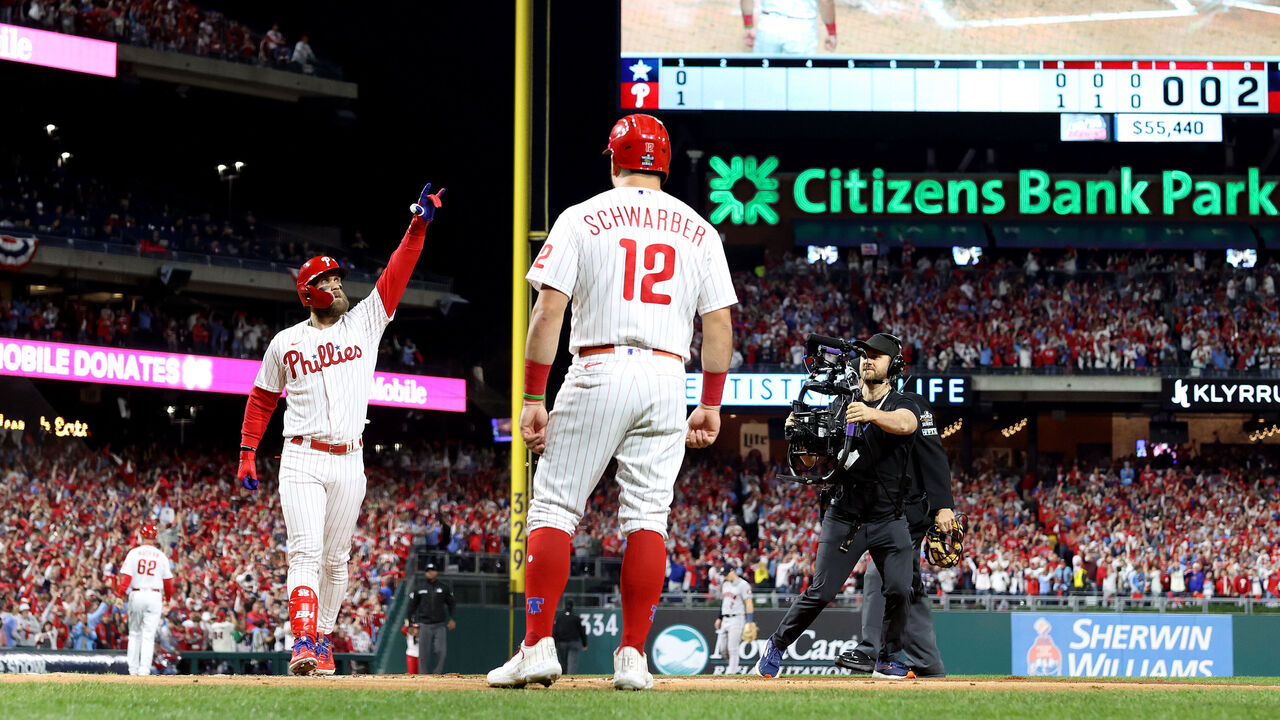
‘I want to be able to have a title’
Harper connected on his 300th career home run last month, becoming the 158th player and fourth-youngest active player to reach the mark. Now a member of the Phillies after signing a 13-year, $330-million deal in March 2019, his is the second-richest free-agent contract in MLB history, surpassed only by Aaron Judge.
BRYCE. HARPER.#RingTheBell pic.twitter.com/zy0uCGTa6Q
— Philadelphia Phillies (@Phillies) August 30, 2023
Harper’s fully embraced being a Philadelphian; you’d swear he grew up next to Veterans Stadium. He’s practically best friends with the club’s iconic Phanatic mascot, and he loves how intense the fan base is – something that’s scared a fair number of other players away.
“They expect greatness out of all of us,” Harper said.
The pressure of playing in a sports-crazy city is something he believes makes him better.
Harper admits to routinely listening to sports talk radio on his drive into Citizens Bank Park, and was inspired to recently hit a home run for frequent caller “Chuck.”
“When you play in Philadelphia, you start understanding what it takes to get to that next level,” he said.
Harper’s certainly delivered five seasons into his Phillies tenure. He was the NL MVP in 2021, becoming the fifth player to win an MVP for multiple teams. He was an All-Star in 2022, and claimed NLCS MVP honors while helping guide the Phillies to last year’s NL pennant. They fell in six games to the Houston Astros in the World Series.
“To see Bryce continue to perform the way he has (in Philadelphia), it’s hats off to him, because it’s not easy,” Scherzer said. “(That big contract) can trip up a lot of guys.”
Last season’s World Series run ignited something else inside Harper. He played October baseball with a torn UCL that eventually needed Tommy John surgery in November. He returned to the lineup only 160 days later – the fastest any player has recovered from the procedure.
“At the end of the day, if I don’t win another award, I want to be able to have a title – to have a ring on my finger,” Harper said.
Luckily for Harper, the current Phillies architect has already won two World Series as a lead executive. Dombrowski owns a reputation of assembling star-studded rosters, and while he wasn’t running the Phillies when they signed Harper, he was happy to inherit the superstar.
“If you can have a player that you can build around, you’re very fortunate,” Dombrowski said of having Harper. “He’s in the prime of his career with quite a few years to play. It’s a situation where it makes your job a lot easier to have that type of player right in the middle of your order, and is going to be there for a long time. You can build around them, which then attracts other players that want to play with them. It’s huge.”
Dombrowski believes having Harper signed long term helped recruit other star players. Nick Castellanos, Kyle Schwarber, and Trea Turner all signed over the last two seasons, the latter inking an 11-year, $300-million deal.
“Everybody respects (Harper),” Dombrowski said. “When we signed Turner, he turned down more money elsewhere, but he knew Bryce and knew what type of player he was and played with him in the past. Now, there were other players, too, but I think that’s very helpful.”
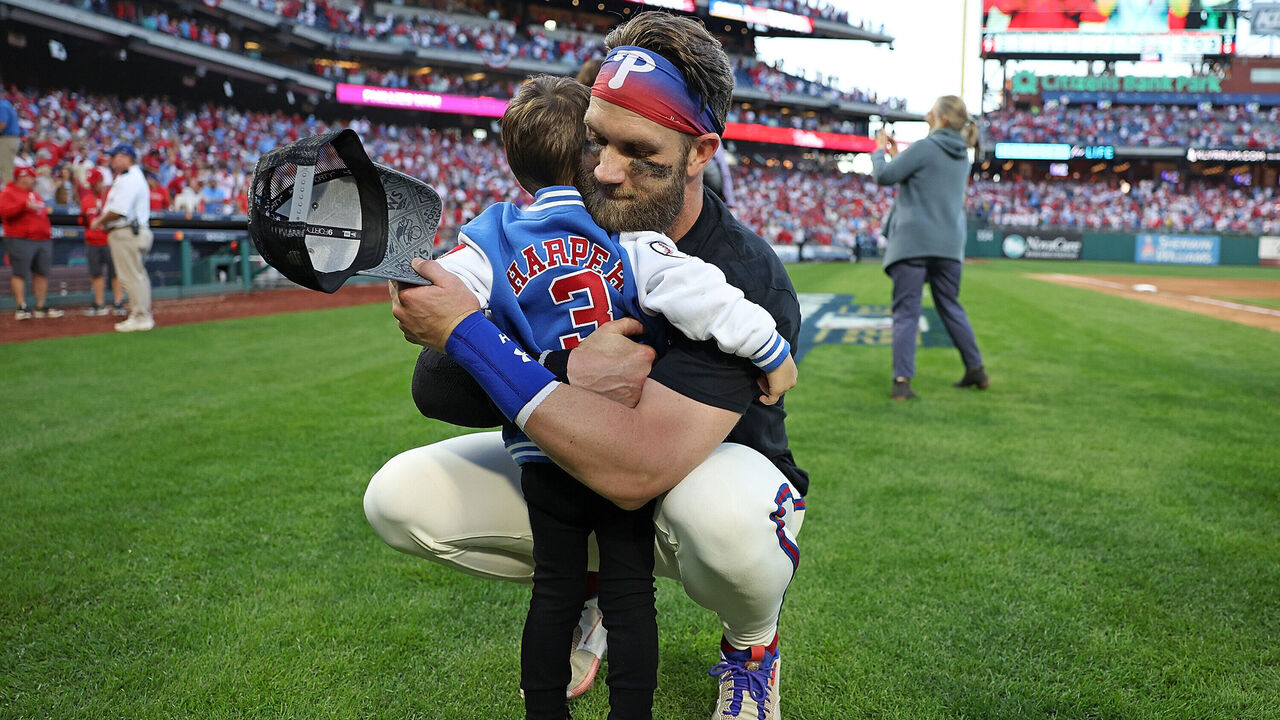
‘Don’t let it pass by too quick’
When Harper was looking to sign his free-agent contract in 2019, he was angling for a team that would help him win his first World Series, but he also wanted to set down roots with his wife, Kayla.
Harper is a father now, to three-year-old Krew and two-year-old Brooklyn. Becoming a dad changed Harper’s view on a lot of things, he said.
“I think everybody grows. Perspective wise, with my kids, you realize there’s a lot of bigger things than what we do out here (on the field). Trying to be the best you can away from the field and on the field, being a good teammate, being a good person. You put in all that hard work to get to where you are. I love that I’m able to look up and see my kids and my family.”
One thing Harper is looking most forward to in the second half of his career is being able to have his children experience their dad as a major leaguer.
“Krew’s going to be able to grow up in the clubhouse and be around the game for a long time,” Harper said. “I look forward to hopefully playing into my 40s and him being in here.
“I’ll have to blind him a little bit from certain things,” he joked, looking around the clubhouse.
Harper is nearing the end of his 12th MLB season and has played over 1,500 regular-season games. He’s experienced many different things on the diamond, so many that he never knows what can happen on a given night. He’s made a point to try and soak everything in.
“I’ve been able to see four no-hitters,” Harper said. “Seeing (Michael) Lorenzen do what he did (earlier this season), I kind of stood there and watched everything around it. You see the family, you see the kids, you see everybody crying, everybody’s happy. You’re gonna remember those moments. I was just so incredibly happy for him.
“I love seeing guys have success. I don’t care who you are in this game, from our side or the other. I always want to see guys have success, see greatness, because this game is gonna go by quick and you might not ever see another Mike Trout or another Shohei Ohtani. I don’t think we give guys enough credit and I don’t think (players) give themselves enough grace, because this game is really hard and seeing guys have success is a lot of fun.”
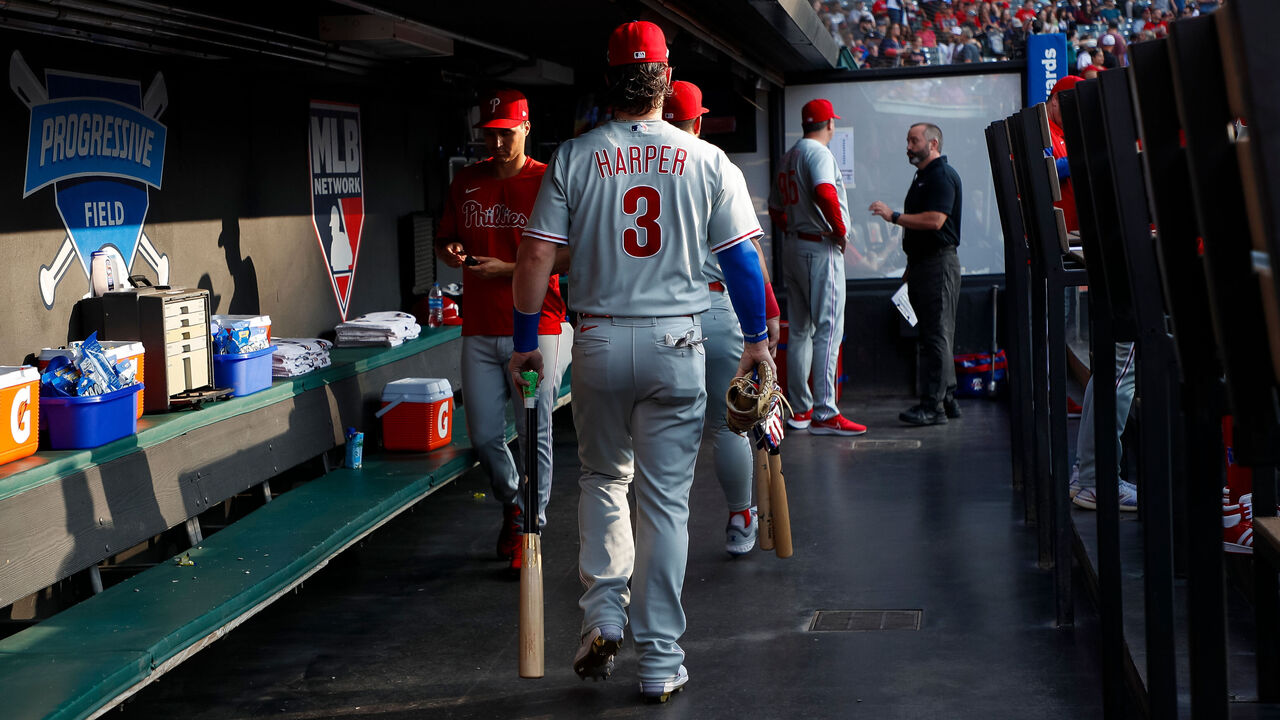
It’s been 14 years since that Sports Illustrated article was published. While plenty has changed, Harper’s goal of one day being enshrined in Cooperstown hasn’t.
“I think anytime you start your career you can say whatever you want. Everybody changes from the time they are six to 25, but those goals are still the same,” Harper said. “Every time you walk out on to the field, you want to be the best player you can, and you have those individual goals. But there’s nothing better than getting to the postseason and trying to win the World Series.”
Looking back on his career, Harper talks a lot about growth that comes with so much life experience. He’s loved being a major leaguer despite the overwhelming pressure. And though he’s in his prime, he understands this won’t be his life forever.
Asked what he’d tell his 16-year-old self if he had the chance, Harper takes a second to think before answering.
“Don’t let it pass by too quick. Understand that every moment, every good, or every bad is there for a reason. You’re gonna go through stretches in life, not just on the baseball field, but everywhere else, that are really good stretches and others that are pretty tough.
“But I’m so fortunate. I’m so thankful to be where I am today. Having the opportunities to play this great game. Just try to enjoy it. People always talk about that, right? Like everybody always says, ‘It goes real quick.’ You’re sitting there at 19 years old and you’re like, ‘Yeah right.’ And then you’re 30 years old and I’m sitting here going, ‘Gosh, dang’. It’s been super quick. I’ve had some good and I’ve had some bad. I’ve had a lot of fun as well. So if I look back, I would tell him just to enjoy it a little bit more.”
